A ‘deep-dive’ project spotlight. By Benedict Wilson, Senior Science and Policy Consultant
12th November 2025
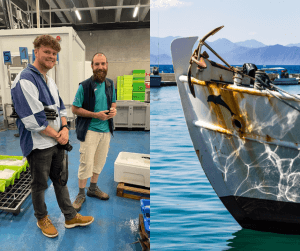
Shooting at the Port of Pasaia with Eneko Bachiller (AZTI), and a moored fishing vessel in Patras, Greece.
2025 has been a landmark year for our Oceans. The 2025 UN Ocean Conference was held in June, deadlines to meet 30% ocean protection by 2030 loom, and steps towards achieving legal protection of the High Seas continue apace. Additionally, alongside this, there has been a growing public awareness of the challenges facing ocean biodiversity, fisheries sustainability, and our coastal communities. At the same time, in September, four years of Mindfully Wired communicating for SEAwise – an ambitious research programme funded by the European Union – came to a close.
We took the chance to reflect on a jam-packed final year of working directly with fisheries scientists and stakeholders across the breadth of Europe. As part of this, we explored key themes and impacts acting on European seas and the latest research to inform effective Ecosystem Based Fisheries Management, communicated via four short scientific documentary films.
The challenge? To spotlight the real-world practicalities and intricacies of achieving effective and balanced management in the North Sea, Baltic Sea, Mediterranean Sea, and the Western Waters.
The purpose? Telling the story of SEAwise and how accounting for the ecosystem can help overcome the unique barriers to achieving fisheries sustainability in each of the project’s regions.
The result? Four carefully crafted, edited, and published case study story films, sharing the voices of SEAwise’s researchers and stakeholder network, including fishermen and industry advisors, as they navigate the journey towards achieving effective fisheries management in Europe.
Follow my journey across Europe, as I share insights into the creative journey below.
Onboard in the Bay of Biscay, to online in West Cork
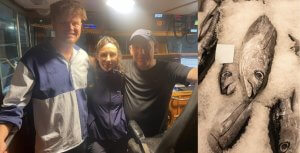
Benedict Wilson and Lia ní Aodha (Mindfully Wired) onboard with Josu Elduaien, skipper of Ostarte at the Port of Pasaia, Northern Spain.
Earlier this summer we released the first film in the series – ‘Shifting Seas: The Western Waters Story,’ which addresses climate change impacts on fish and fisheries in the Bay of Biscay and Celtic and Irish Seas. The film shares footage of tuna landings and market activity captured in the early hours at the Port of Pasaia, in Northern Spain. Last year, myself and Lia ní Aodha visited the Basque region’s coast, speaking to fishermen and fisheries experts in the region including Basque producer organisations and SEAwise scientists.
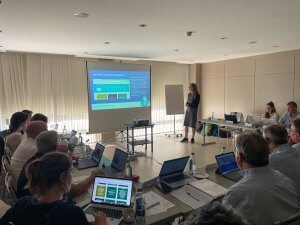
From the Port of the Pasaia, to the North Sea Advisory Council meeting in San Sebastian, July, 2024.
A day of two halves, we started out the day at the local port where we spoke to the skippers and viewed the day’s catch, before joining proceedings at the North Sea Advisory Council (NSAC) meeting in San Sebastian, where SEAwise Coordinator, Anna Rindorf disseminated SEAwise results and we discussed hopes for management with the NSAC members. Heading north, the film also shares the results of a stimulating conversation held online with Patrick Murphy, CEO of the Irish South and West Fish Producers’ Organisation and member of the North Western Waters Advisory Council, who provides an Irish perspective on challenges facing Celtic Sea fisheries, and hopes for how research projects like SEAwise can support sustainability under climate change. A fountain of industry knowledge, Patrick provided fascinating insights and had many great tales to tell.
Working together in Greek and Italian waters

Alexis Chaliotis (Left) and Konstantinos Kyriakopoulos (Right), local small-scale fisherman from Alykes, The Gulf of Patras.
SEAwise’s Mediterranean case study involved research teams working in the Adriatic and Western and Eastern Ionian Seas. To get to grips with the Mediterranean story, we undertook foundational interviews at the SEAwise December AGM hosted at the Politecnico di Milano, and fascinating online deep dives into the complexities of the marine environment and management of the seas in Italian and Greek waters. With different management and ecological systems on either side of the Ionian, the aim of the film was to share the intricacies of designing management systems that fit the unique socio-political landscape, and unpack how SEAwise has incorporated social science and economic approaches to inform more tailored management.
This led to the chance to head to Athens and Greece, where I spoke to researchers at the Hellenic Centre of Marine Research and fishermen working in the Gulf of Patras. After landing in Athens, I was joined by Dimitra Syrou, who represented the team at HCMR. We set out on the bus to Patras, providing a fantastic opportunity to hear all about the latest SEAwise and wider marine research, as well as the current state of the seas and society in Greece. Acting as my local experts, translators, and facilitators, I am very grateful to Dimitra and Vlasis Ketsilis-Rinis, and the rest of the team at HCMR for supporting the Eastern Ionian portion of the film.
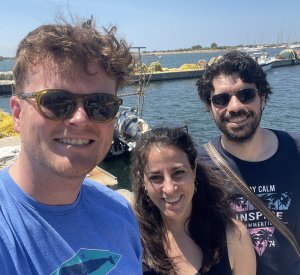
A happy research team after a sea turtle decided to kindly ‘interrupt’ filming – turns out they are invested in their protection too! Left to Right: Benedict Wilson (MW), Dimitra Syrou (HCMR), and Vlasis Ketsilis-Rinis (University of Patras)
The final film shares conversations with local fisheries expert Envangelos Tzanatos and interviews conducted in Greek with two local fishermen: Alexis and Konstantinos, who spoke to us about their fishing lives in Alykes, Patras. As the sun set over the local fishing village and the traditional fishing boats spluttered out into the Gulf, they shared their perspectives of the challenges facing the ecosystem in the region. That night we were generously hosted by Konstantinos and his family at his family run restaurant, and we reflected back on an action packed day over local Greek delicacies. The trip was rounded off with further interviews with the HCMR researchers based back in Athens. These discussions, combined with interviews and collaboration with the ever-helpful Maria Teresa-Spedicato and Isabella Bitetto from the COISPA Foundation, Italy, helped share the story in the Adriatic Sea, and completed the Mediterranean Case Study story: ‘Navigating a Complex Seascape Together.’
A call to action in the Baltic Sea
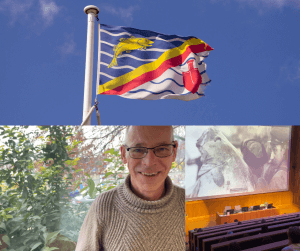
Flying the flag for change. Keeping hope for Baltic cod – fishing heritage, on the verge of history. Rudi Voss (Bottom Left)
Next up on the SEAwise adventure was communicating the sad state of the Baltic Sea. An ecosystem on the edge, the Baltic Sea has seen considerable declines in its fish populations and faces multiple human pressures, from fishing to eutrophication. Facing an uphill battle towards ecosystem recovery and sustainability, the political and societal need for fast and effective action on the whole of the ecosystem in the region is of critical importance. As a result, our Baltic Sea case study film – ‘The Case for an Ecosystem Approach’ shares a call to action from the Western Baltic.
To help share this story, I headed to Kiel on the Baltic coast of Northern Germany, where I met with Professor Rudi Voss, fisheries expert and bio-economic modeller in the region. Rudi and I discussed the challenges facing the region, the latest scientific research, and headed out to visit the local fishing port in the region, now eerily quiet due to zero catches for once numerous Western Baltic cod and herring. I joined Rudi and fellow SEAwise researcher Stefan Neuenfeldt at a meeting for the International Council for the Exploration of the Sea (ICES) Working Group on Ecosystem-Based Fisheries Management of the Western Baltic Sea (WGECOBAL). It was a great opportunity to hear first hand about the state of the region, contribute to discussions, share SEAwise results, and speak to Stefan and the Co-Chair Christian Möllmann about all things Western Baltic.
Bringing together conversations with the team from Kiel, with a conversation with Henn Ojaveer, Professor of Marine Ecosystems at the University of Tartu in Estonia (The Northern Baltic), we were able to share a powerful and emotive message about the urgent need for Ecosystem Based Management in the Baltic Sea.
From stakeholder workshops to scientific symposia
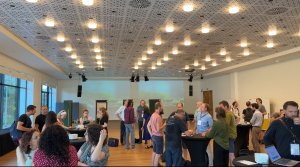
EBFM Symposium 2025, Brussels.
With our final film focused on the North Sea case study- ‘Balancing trade-offs’, the aim was to mirror the SEAwise project and Mindfully Wired Communications team’s work on bringing together science and industry via eight stakeholder workshops delivered with Advisory Councils, NGOs, and ICES. In addition, the film sought to share action and conversations from ‘EBFM Symposium 2025’ – a symposium bringing together scientists, policy makers, and industry. The event held in Brussels in July 2025 was co-designed and delivered by Mindfully Wired, the SEAwise team, and its partner institutions. Find out more here.
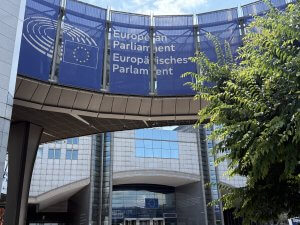
European Parliament. Brussels.
The North Sea film highlights the importance of collaboration and shares the story of balance in European fisheries decision-making. In delivering this film, it was a pleasure to bring together many voices from across different sectors to share a coherent message for how we can tackle sustainability and provide an insight into the collaboration achieved through the workshops and events delivered in the final stages of the project. It represents many conversations held with scientists, fishers, and industry members across Europe, and the process of communicating for and facilitating change which supports marine ecosystems and coastal communities across Europe.
With special thanks!

The Mindfully Wired, SEAwise team at EBFM Symposium 2025. Left to Right: Benedict Wilson, Georgia Wells, Lia ni Aodha, Sara Mynott, and Georgia Penrose
It was a privilege and a pleasure to work together with all the contributors and colleagues that added value to this SEAwise Case Study film series, and helped bring to life four fascinating real-life stories.
Thanks for reading!
Benedict
In the project’s final year the SEAwise communications team have been working hard to deliver a bumper package of communications, which can be found on the SEAwise website.